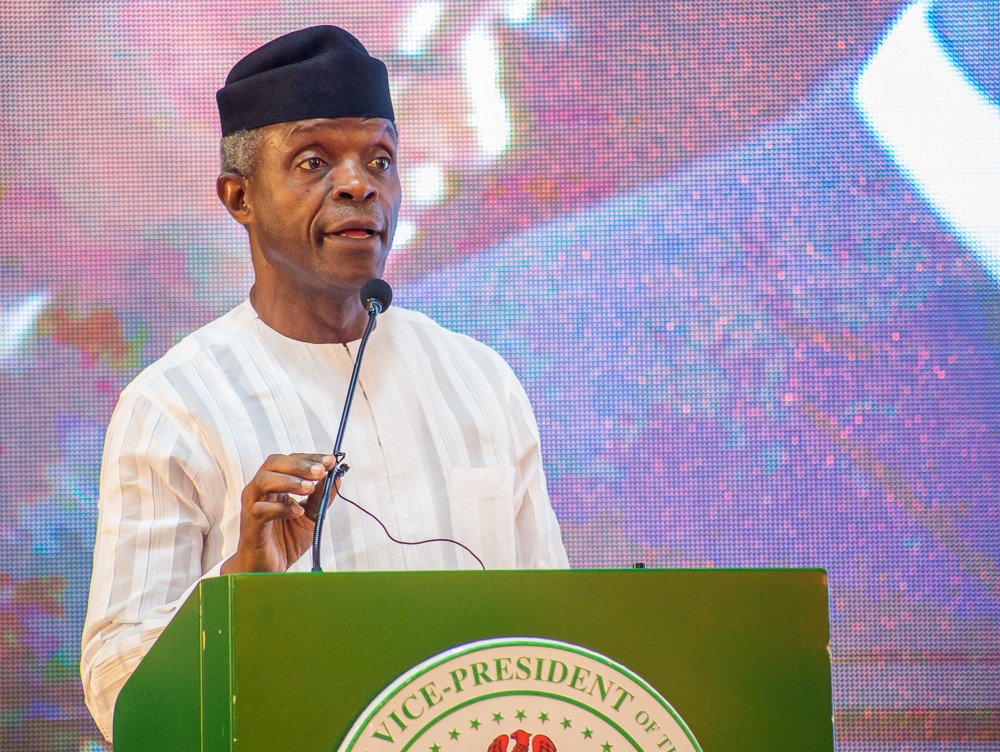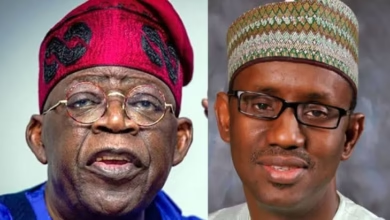
In spite of the despair that came with the COVID-19 pandemic and its attendant consequences, Nigeria decided to seize the opportunity to reset the economy amidst worldwide economic challenges, according to Vice President Yemi Osinbajo, SAN.
Prof. Osinbajo stated this in Abuja on Tuesday at a Webinar organised by the Commonwealth Enterprise and Investment Council, CWEIC, with its focus on Nigeria.
According to the Vice President, “it seemed the sun was beginning to shine quite brightly after the years of recession and its immediate aftermath. Then came COVID-19 possibly the worst economic crisis the world has seen. For us in Nigeria, it was a perfect storm for oil prices, Russia and Saudi Arabia choosing that very moment for a price war. Then the inevitable lockdowns resulting in closure of businesses, our huge informal economy all but crashed and Government revenues fell too by over 40%.
“But the silver linings were perhaps bolder in the dark clouds.
The President decided that we could seize the opportunity to reset our economy in a way that may have been impossible had there not been a worldwide economic crash.
“I was asked to chair an inter-ministerial team to develop our Economic Sustainability Plan. A plan which we hope will, in the next 12 months or so, avoid a deep and prolonged recession by supporting businesses and households, but perhaps more importantly, addressing long-term structural vulnerabilities
“Taking into account our economic size and fiscal limitations, we have put together a stimulus package of N2.3trillion, which is just over 1.5% of national income. If other factors like the price of oil and length of the COVID-19 pandemic do not worsen further, these interventions should ameliorate the situation with a mild recession expected of minus 0.59%.”
Other speakers at the international webinar include Lord Marland of Odstock, the Chairman of the CWEIC, Sir Lynton Crosby, Chief Executive Officer C|T Group and the Industry, Trade & Investment Minister, Otunba Adeniyi Adebayo.
Read the Vice President remark below
Thank you for that kind introduction. I am pleased to be participating in this special session focused on Nigeria. There is never a good time for a pandemic, but there can be a terribly wrong time.
That’s how it seemed three months ago as COVID – 19 began to ravage. January 2020, oil prices approached $70 a barrel for the first time since the crash of 2015/2016 which saw prices crash to sub $30 a barrel, Q3 2019 growth was 2.55%, modest but clearly on the upward trajectory, 3% growth was well in sight.
Our Economic Recovery and Growth Plan was beginning to make sense. Work was on-going in major rail, road and bridge projects along the main national trade corridors. The Engineering, Procurement and Construction (EPC) arrangements on our Liquefied Natural Gas (LNG) Train 7 which will unlock an additional 30% more LNG output had commenced.
It seemed the sun was beginning to shine quite brightly after the years of recession and its immediate aftermath. Then came COVID-19, possibly the worst economic crisis the world has seen. For us in Nigeria, it was a perfect storm for oil prices, Russia and Saudi Arabia choosing that very moment for a price war. Then the inevitable lockdowns resulting in closure of businesses, our huge informal economy all but crashed and Government revenues fell too by over 40%.
But the silver linings were perhaps bolder in the dark clouds. The President decided that we could seize the opportunity to reset our economy in a way that may have been impossible had there not been a worldwide economic crash.
I was asked to chair an inter-ministerial team to develop our Economic Sustainability Plan. A plan which we hope will in the next 12 months or so, avoid a deep and prolonged recession by supporting businesses and households, but perhaps more importantly, addressing long-term structural vulnerabilities.
Taking into account our economic size and fiscal limitations, we have put together a stimulus package of N2.3trillion, which is just over 1.5% of national income. If other factors like the price of oil and length of the COVID-19 pandemic do not worsen further, these interventions should ameliorate the situation with a mild recession expected of minus 0.59%.
We have taken the opportunity to remove petrol subsidies and to insist that power distribution companies must engage with customers to ensure that new tariffs are based only on improved power supply. We are talking of service reflective tariffs.
The Central Bank of Nigeria is also committing to moving to a unified exchange rate, to improve certainty in trade and investment. In addition to using fiscal and monetary measures to stimulate the economy, our main objectives are to retain and create jobs, to assist vulnerable people, support businesses and undertake infrastructural investments. I am happy to see from the research that jobs, retaining jobs and creating more opportunities tops Nigerians’ priorities when it comes to what they believe the COVID-19 response should be like.
Some key interventions include: Jobs for Food which is an agricultural programme aimed at expanding the acreage under cultivation across the country, to create, we hope, hundreds of thousands of jobs and we also intend to guarantee uptake processors, aggregators and to some extent, by government.
We also have a Jobs through Homes programme which is a programme to provide jobs and increase our national housing stock, at the same time by a massive social housing programme where we intend to engage young professionals and artisans who are involved at the moment, in small businesses, building and using local products such as cements, doors, tiles, windows and paint.
We also have a Solar Homes Systems Programme where we intend to engage private solar power companies who will be able to access cheap loans to provide modular solar-powered units to about 5 million households which will roughly translate to serve 25 million people in rural or under-served areas. At the moment, we have about 40million homes without power. So, we expect that this will be a major dent in that deficit.
The scale required means we will be encouraging suppliers to establish production facilities in the country. We expect to be able to attract solar companies to establish manufacturing and assembly plants in Nigeria.
Supporting small businesses is also a priority and I am sure the Minister of Industry, Trade and Investment will talk more about it.
We are also looking at the Future of Jobs programme in technology taking into account the ‘new normalʼ, our creative and significant youth population and the need to prepare our economy to be an outsourcing hub, providing services across the whole gamut of possible technology engagements, including animation, software engineering and data analysis.
These are areas where we have invested considerably already and we intend to do a bit more and we hope that some of the efforts we put into the response will address these areas even more pointedly.
To be sure, improving health outcomes is very much part of the package. To meet the immediate challenge, we have dug deep to find resources to respond to the pandemic. We have more built isolation centres and laboratories, incentivizing medical personnel, buying test kits and personal protective equipment, as well as several other medical equipment.
We have increased the number of modular laboratories that can handle COVID-19 samples from 5 at the onset of the pandemic to 39 today.
The crisis has also revealed significantly, the vulnerability of our health sector. So, as part of the Economic Sustainability Plan, we are also looking at the universal health coverage, about improving the work we are doing in universal health insurance with a view to universal health coverage by a combination of public finance and mandatory social insurance.
While we are bullish on promoting local production, we remain committed to engaging with our traditional trading partners. This is in recognition of the potential contribution of trade to growth.
The African Continental Free Trade Area (AfCFTA) is pertinent in this regard, but so certainly is also trade with our Commonwealth partners, including the United Kingdom. This was indeed evident from Nigeria’s participation in the UK-Africa Investment Forum held earlier this year. It is particularly noteworthy that intra-Commonwealth trade is projected to rise from an estimated $1trillion this year to $2.75trillion by 2030 and we intend to be a major part of this growth.
It is not news of course that the COVID-19 pandemic has distorted international trade with disruption of global value chains, export bans, and protectionist policies. On our part, Nigeria remains committed to the multilateral trade system but we will ensure that our economy is not subjected to unfair trade practices.
Ultimately, we see Nigeria as ‘Africa’s Gateway Economy’. As the continent’s most populous nation and its largest economy, we think that we can leverage our geographical location, which is right in the middle of far-flung Commonwealth countries, we are poised to catalyze intra-Commonwealth trade. Our investments in fast-growing sectors and infrastructure, power, rail, roads and several other areas especially technology where we think we can benefit from other Commonwealth countries.
Once again, I thank the Commonwealth Enterprise and Investment Council for convening this important discussion especially now, when we certainly see a greater need for socio-economic engagements with our Commonwealth partners and we are set and ready to continue these engagements and we look forward to not just what this particular session will bring but to all our future cooperation.
Thank you very much indeed.
Laolu Akande
Senior Special Assistant to the President on Media and Publicity





